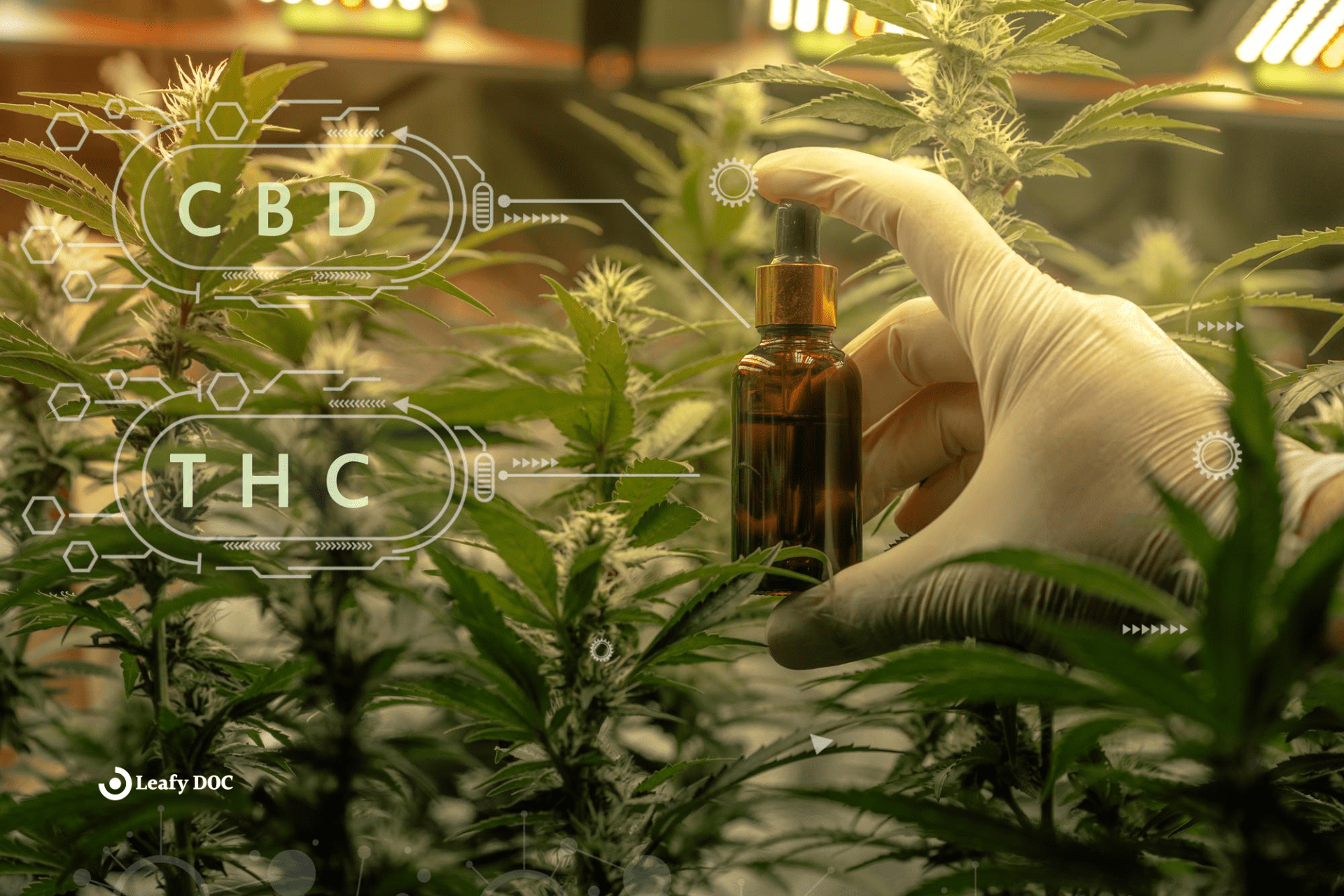THC vs. CBD: Which is Best for Your Medical Condition?
by Haley Mills · May 23, 2023
Learn about the difference between THC and CBD and which one is best for your medical condition. Discover the unique properties of each cannabinoid and how they can be used for treatment.

In the ever-evolving world of medical marijuana, the therapeutic potential of two primary cannabinoids – Tetrahydrocannabinol (THC) and Cannabidiol (CBD) – has garnered significant attention from researchers, medical professionals, and patients alike. Both compounds have demonstrated various medicinal properties. However, their varying mechanisms of action and distinct side effect profiles can make it challenging to determine which is best suited for specific medical conditions.
This article explores the comparative analysis of THC and CBD, their unique characteristics, scientific evidence supporting their medical applications, and how to decide on the most appropriate cannabinoid for your particular health needs.
Comparing Cannabinoids: THC & CBD
As the two most prominent cannabinoids found in the cannabis sativa plant, THC and CBD offer a diverse range of therapeutic benefits. Here, we’ll dive into the unique properties of each compound, examining their distinct molecular structures, mechanisms of action, and how they interact with the endocannabinoid system to exert their effects on various medical conditions.
In The Body
The Endocannabinoid System: The ECS is a complex cell-signaling system that plays a crucial role in maintaining homeostasis within the body. It comprises three main components: endocannabinoids (naturally occurring compounds in the body), receptors (CB1 and CB2), and enzymes responsible for the synthesis and degradation of endocannabinoids. The ECS involves various physiological processes, including pain perception, mood regulation, immune response, and appetite.
THC: THC is a partial agonist of both CB1 and CB2 receptors, with a higher affinity for the CB1 receptor. CB1 receptors are primarily found in the brain and central nervous system, while CB2 receptors are more abundant in the immune system and peripheral tissues. When THC binds to the CB1 receptor, it alters the release of neurotransmitters such as dopamine and glutamate, resulting in the characteristic psychoactive effects associated with cannabis consumption. THC’s interaction with the CB2 receptor also contributes to its anti-inflammatory and immunomodulatory effects.
CBD: Unlike THC, CBD has a low affinity for CB1 and CB2 receptors and acts as an antagonist or negative allosteric modulator at these sites. This means that CBD can inhibit the binding of THC and other cannabinoids to the receptors, attenuating the psychoactive effects of THC. Instead of directly binding to the receptors, CBD indirectly influences the ECS by increasing the levels of endocannabinoids like anandamide, which is crucial in regulating mood, pain, and other functions.
CBD also interacts with various non-cannabinoid receptors, such as the serotonin (5-HT1A) receptor, which is involved in anxiety and depression regulation, and the transient receptor potential vanilloid 1 (TRPV1) receptor, which plays a role in pain perception and inflammation. These interactions contribute to CBD’s diverse therapeutic effects, such as its anxiolytic, antidepressant, and anti-inflammatory properties.
Is Medical Marijuana Legal?
At the federal level, the legal distinction between THC and CBD primarily depends on the source of the cannabinoids. The 2018 Farm Bill legalized the cultivation of industrial hemp and the production of hemp-derived products, including CBD, as long as they contain no more than 0.3% THC by dry weight in the cannabis extract.
As a result, hemp-derived CBD products with less than 0.3% THC are legal under federal law. However, the Food and Drug Administration (FDA) has the authority to regulate CBD products, and currently, CBD is not approved as a dietary supplement or food additive.
On the other hand, THC from cannabis plants is still considered a Schedule I controlled substance under the Controlled Substances Act, making it illegal at the federal level and per the Drug Enforcement Administration (DEA). This classification implies that THC has a high potential for abuse and no currently accepted medical use. Nonetheless, the FDA has approved a few THC-based medications, such as dronabinol (Marinol) and nabilone (Cesamet), for specific medical conditions.
State Medical Marijuana Laws:
Despite the federal classification of THC, many states have enacted medical marijuana laws that allow patients with qualifying conditions to access THC and CBD products for medical use. These state laws vary regarding qualifying conditions, possession limits, and the allowed forms of medical cannabis.
- California: In 1996, California became the first state to legalize medical marijuana through the Compassionate Use Act. Patients with qualifying conditions such as cancer, anorexia, AIDS, chronic pain, and others can use medical cannabis, including THC and CBD products, with a physician’s recommendation.
- New York: New York’s Compassionate Care Act, passed in 2014, allows patients with qualifying conditions, including epilepsy, cancer, HIV/AIDS, and chronic pain, to access medical marijuana products with a physician’s recommendation. However, the state has stricter regulations regarding the allowed forms of cannabis, limiting it to non-smokable forms such as capsules, tinctures, and vaporizers.
- Florida: Florida’s medical marijuana program, established in 2016, permits patients with qualifying conditions like cancer, epilepsy, glaucoma, HIV/AIDS, Crohn’s disease, and Parkinson’s disease to use medical marijuana products, including THC and CBD, with a physician’s recommendation. The state allows various forms of cannabis, including edibles, tinctures, and topicals for medical benefits.
Physical Benefits
THC:
- Provides pain relief due to its analgesic properties
- Reduces nausea and vomiting, particularly for patients undergoing chemotherapy
- Stimulates appetite in patients with conditions such as cancer or HIV/AIDS
- May alleviate muscle spasms and spasticity in multiple sclerosis patients
CBD:
- Demonstrates anti-inflammatory and analgesic properties, making it effective in treating various types of chronic pain
- Offers anxiolytic and antidepressant effects, potentially benefiting those with anxiety and depression.
- Reduces seizure frequency and severity in epilepsy patients, including those with rare and severe forms such as Lennox-Gastaut syndrome and Dravet syndrome
- Exhibits neuroprotective properties, potentially aiding in the treatment of neurodegenerative diseases like Alzheimer’s, Parkinson’s, and multiple sclerosis
Psychoactive Components
THC:
- Binds to CB1 receptors in the brain, leading to psychoactive effects such as euphoria, altered perception, and sedation
- It may induce anxiety or paranoia in some individuals, mainly when consumed in high doses
CBD:
- Lacks intoxicating effects due to its low affinity for CB1 and CB2 receptors
- It can act as a negative allosteric modulator at CB1 receptors, potentially reducing the psychoactive effects of THC when consumed together.
- It may mitigate THC-induced anxiety or paranoia.
Potential Adverse Effects
THC:
- May cause short-term memory impairment
- It can induce dizziness, dry mouth, and increased heart rate.
- This may increase anxiety or paranoia in some individuals, especially at high doses.
- It may lead to drug abuse if used irresponsibly.
CBD:
- Generally well-tolerated with a favorable safety profile
- It may cause mild side effects such as dry mouth, drowsiness, and diarrhea, particularly at high doses.
- It may interact with certain medications, so it is essential to consult a healthcare professional before using CBD.
Drug Testing Facts: CBD and THC
THC:
- Most standard drug tests are designed to detect THC or its metabolites in urine, blood, saliva, or hair samples
- THC is fat-soluble and can be stored in the body’s fat cells, potentially leading to detection in drug tests even after several days or weeks, depending on individual factors such as frequency of use, body fat percentage, and metabolism
CBD:
- Typically not detected in standard drug tests, as these tests are designed to identify THC or its metabolites
- However, using full-spectrum CBD products with trace amounts of THC could potentially result in a positive drug test for THC, particularly with frequent use or high dosages.
Best Medical Conditions for Treating With CBD
Cannabidiol (CBD) has gained widespread recognition for its versatile and non-intoxicating therapeutic potential. In this section, we’ll discuss the top medical conditions that can benefit from CBD treatment, highlighting the scientific evidence behind its efficacy and the recommended dosages and administration methods to optimize its therapeutic outcomes.
- Epilepsy and Seizure Disorders: One of CBD’s most well-established medical applications is treating epilepsy and seizure disorders. In 2018, the FDA approved Epidiolex, a CBD-based drug, for treating two rare and severe forms of epilepsy: Lennox-Gastaut syndrome and Dravet syndrome. Multiple clinical trials have demonstrated the efficacy of CBD in reducing seizure frequency and severity. Recommended dosages for epilepsy typically range from 10-20 mg/kg/day, with administration methods including oral solutions and capsules.
- Anxiety and Depression: CBD has shown promise as a potential treatment for anxiety and depression due to its anxiolytic and antidepressant properties. Preclinical and clinical studies have reported the effectiveness of CBD in reducing symptoms of generalized anxiety disorder, social anxiety disorder, and post-traumatic stress disorder (PTSD). Dosages for anxiety and depression can vary greatly depending on the individual, but a common starting point is 25-50 mg/day, with the possibility of gradual increases if needed. Sublingual administration (drops under the tongue) and oral capsules are popular methods of CBD intake for these conditions.
- Chronic Pain and Inflammation: CBD’s anti-inflammatory and analgesic properties make it an attractive option for treating various types of chronic pain, including neuropathic pain, fibromyalgia, and arthritis. Research suggests CBD can modulate the immune system, reduce inflammatory cytokines, and interact with the endocannabinoid system to alleviate pain. For chronic pain management, dosages can range from 20-100 mg/day, with topical creams, transdermal patches, and oral solutions being common administration methods.
- Neurodegenerative Diseases: CBD has demonstrated neuroprotective properties in a placebo-controlled trial that may be beneficial in treating neurodegenerative diseases such as Alzheimer’s disease, Parkinson’s disease, and multiple sclerosis. Evidence suggests that CBD can reduce inflammation, oxidative stress, and excitotoxicity, which are key factors in the progression of these diseases. Dosages and administration methods for neurodegenerative conditions and chronic neuropathic pain may vary depending on the disease and symptom severity, with oral solutions and capsules commonly used.
Individual responses to CBD may vary, and consultation with a healthcare professional is recommended when considering CBD treatment for any medical condition. As more research is conducted, our understanding of CBD’s therapeutic potential and optimal dosages will continue to evolve, further solidifying its role as a versatile treatment option.
Top Medical Conditions for THC Treatment
Tetrahydrocannabinol (THC) has long been known for its psychoactive properties and potent medicinal effects. This section explores the medical conditions that can benefit the most from medical cannabis treatment with THC. It examines the research supporting its efficacy, potential side effects, and critical considerations for patients and medical professionals when selecting THC-based therapies.
- Chronic Pain: THC has been demonstrated to be effective in managing chronic pain, including neuropathic pain, cancer-related pain, and pain associated with conditions like fibromyalgia. Its analgesic properties are attributed to its ability to activate CB1 receptors in the endocannabinoid system, thereby modulating pain perception. THC-based medications such as dronabinol (Marinol) and nabilone (Cesamet) have been approved by the FDA for pain management. Dosages may vary depending on the severity of the pain and individual tolerance, with oral capsules, tinctures, and vaporizers being common administration methods.
- Nausea and Vomiting: THC has proven to be an effective antiemetic, particularly for patients undergoing cancer chemotherapy. Dronabinol (Marinol) and nabilone (Cesamet) are FDA-approved THC-based medications for the treatment of chemotherapy-induced nausea and vomiting (CINV). Clinical trials have demonstrated THC’s efficacy in reducing CINV compared to conventional antiemetics. The dosage for nausea and vomiting usually ranges from 2.5-20 mg daily, with oral capsules and vaporizers being the preferred administration methods.
- Appetite Stimulation: THC is well-known for stimulating appetite, which can benefit patients with conditions such as cancer, HIV/AIDS, and other chronic illnesses that result in appetite loss and cachexia. The FDA has approved Dronabinol (Marinol) for this purpose. Dosages for appetite stimulation can vary, with a typical starting point being 2.5 mg twice a day, gradually increasing if needed. Oral capsules are the most common administration method for appetite stimulation.
- Multiple Sclerosis (MS): Per a few randomized controlled trials, THC has shown potential in managing symptoms associated with multiple sclerosis, such as muscle spasms, spasticity, and neuropathic pain. Clinical trials have reported that THC can reduce spasticity and improve mobility in MS patients. Sativex, a THC and CBD combination oral spray, has been approved for use in several countries to treat MS-related spasticity. Dosages and administration methods may vary depending on the severity of symptoms and individual tolerance.
While THC offers significant therapeutic benefits, it is essential to consider potential side effects such as psychoactive effects, dizziness, dry mouth, and increased heart rate. These side effects may not be suitable for all patients, and individual tolerance should be considered when selecting THC-based treatments.
It is critical for patients and medical professionals to discuss the risks and benefits of THC-based therapies and to consider the possibility of combining THC with CBD for a more balanced approach to treatment. Consultation with a healthcare professional is recommended when considering THC treatment for any medical condition.
Final Thoughts: THC vs. CBD for You
THC and CBD are potent cannabinoids from the cannabis plant with distinct therapeutic properties that can benefit many medical conditions. While THC offers potent analgesic, anti-emetic, and appetite-stimulating effects, its psychoactive nature may not suit all patients. On the other hand, CBD provides a non-intoxicating alternative with strong anti-inflammatory, anxiolytic, and neuroprotective properties, making it a more versatile option for those seeking relief without the risk of psychoactive side effects.
The choice between THC and CBD ultimately depends on the individual’s unique medical condition, symptoms, and personal preferences. In many cases, a balanced approach incorporating both cannabinoids may yield optimal results. As research continues to expand our understanding of the endocannabinoid system and the therapeutic potential of cannabis, it is crucial for patients and medical professionals to stay informed about the latest developments to make well-informed decisions and maximize the benefits of these remarkable compounds.
Last Updated: August 8, 2024
Get Approved for Your Medical Marijuana Card in Minutes!

Get Your Medical Card
Connect with a licensed physician online in minutes

Like This Article?
Share with your friends
Table of Contents
Keep Reading
-
7 Essential Steps for Medical Marijuana in Arkansas
Explore the essential steps to access medical marijuanas in Arkansas for your health needs.
-
Real-Life Patient Stories: How Medical Cannabis Changed Lives
Read real-life patient stories of how medical cannabis changed lives. Find hope and inspiration in these transformative journeys. Click now to discover the power of medical cannabis for yourself!
-
Your Step-by-Step Arkansas Medical Marijuana Application Guide
Navigate the Arkansas medical marijuanas application process with ease and confidence.



